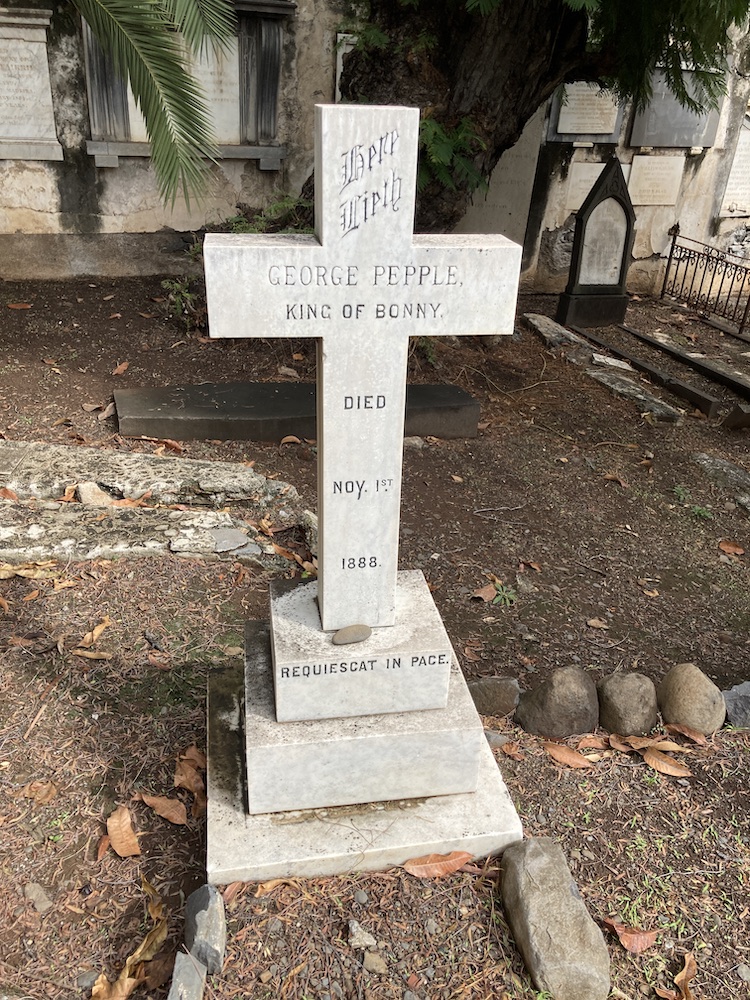
Photograph by Tim Willasey-Wilsey
Known then as now for its healthy climate, Madeira attracted many "health tourists" in the nineteenth century, especially those with consumption (Langum 54). Not infrequently, it was too late for the hoped-for cure, and their graves are still to be found in the English Cemetery at Funchal. Among the more intriguing grave-markers there is that of King George Oruigbiji Pepple (1849-1888) of the African kingdom of Bonny. It seems to have been quite recently restored.
Bonny, deep in the Eastern Niger Delta, and now an oil port, was once an important hub for the Atlantic slave trade. However, in 1807 the slave trade was made illegal in Britain and its colonies. At the time, attitudes towards this in Bonny were ambivalent. James Pope-Hennessy describes a conversation between the notorious slaver Captain Hugh Crow and an earlier king from whom Pepple was descended. The king of the time had expressed bemusement that Europeans should worry about slaves when they themselves were being massacred in their thousands on the battlefields of Austerlitz in the Napoleonic Wars. He also warned Britiain that other countries would come in and override British authority in Bonny. From this we may deduce that he did not fully "buy in" to abolition.
Still, the evidence shows that British ships stopped visiting Bonny from 1807. Crow's ship Kitty's Amelia was apparently the last. The trade in slaves to Brazil, the United States and Cuba continued though, and the British clearly suspected that Bonny was still being used for this purpose. In August 1841 and again in June 1844 the new King, William Pepple, was obliged by the British to prevent any continuing trade from Bonny altogether, in return for which concession he received the sum of $10,000 per annum.
In 1866 William Pepple died and was succeeded by his son George. George himself was a Christian: he had been educated in Bexley, now a part of Greater London, during his father's period of exile in England. There were still slaves in Bonny itself, and Pepple's accession to the throne encouraged the struggle for freedom among those of them who were also Christian converts. The struggle was a very bitter one, not only because of continuing persecution by powerful slave-masters, but because a former slave, Jaja, who had risen from slavery himself to become a rich merchant, tried to remove Pepple from power. The complicated story of Bonny's warring factions and Britain's involvement is told in more detail by Paul Lovejoy (see especially 261-62). What soon becomes clear is that Pepple's influence was limited: another historian describes him as having become "more and more a shadow of a king" (Anene 45). The situation must have taken a toll on him.
However, while he lay in his last resting-place at Funchal, the wider movement towards emancipation continued, putting the whole slavery system in Bonny under pressure. Together with economic problems in the wider world, the support of local missionaries who took in runaway slaves, and the efforts to quash the remnants of the wider slave trade from outside, such stances as Pepple's did gradually bring about the end of the wholesale, unconscionable bartering of individuals for labour.
Link to Related Material
- Slavery and the Anti-Slavery Campaign in Britain
- Edmund Gabriel and the suppression of the Angolan slave trade
- The grave of Commander Cecil William Buckley and his sons in the same cemetery
- Sarah Forbes Bonetta (later Davies), also in the cemetery here
Bibliography
Anene, J.C. Southern Nigeria in Transition, 1885-1906: Theory and Practice in a Colonial Protectorate. Cambridge: Cambridge University Press, 1966.
British and Foreign State Papers, 1866-67. London: William Ridgeway, 1871. See p. 335.
The Church of England Magazine Vol XLI. London: Ewins, 1866: 180.
The Church Missionary Intelligencer Vol XI. London: Hatchard, 1875. See pp. 247-251.
The Friend of Africa Vol I. London; W. Parker, 1841. See pp. 14-15
Langum, Viginia. "'A paradise of invalids': Medical Tourism and the Climate of Prejudice in Nineteenth-century Madeira." Nordic Journal of English Studies 21: 2 (2022): 52-72. Available online at: http://urn.kb.se/resolve?urn=urn:nbn:se:umu:diva-201986
Lovejoy, Paul E. Transformations in Slavery: A History of Slavery in Africa. Cambridge: Cambridge University Press, 2000.
Pope-Hennessy, James. The Sins of Our Fathers. London: Weidenfeld, 1967. See pp. 272-74.
Created 30 August 2024
Last modified 4 September 2024